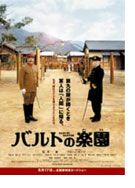

Opening 12 Jul 2007
Directed by:
Masanobu Deme
Writing credits:
Motomu Furuta
Principal actors:
Ken Matsudaira, Bruno Ganz, Hiroshi Abe, Jun Kunimura, Oliver Bootz
In World War I, a 30,000-man Japanese army invaded a German army base in Qingdao, China. They won the battle and captured 4700 German soldiers. This posed an unforeseen dilemma. Any self-respecting Japanese warrior would have committee harakiri before giving himself up, thus eliminating the need for a prisoner-of-war camp. The Germans were not so forthcoming and remained alive. They suffered terribly until someone took pity on their plight and, in 1917, transferred them to Bando POW Camp in Naruto City, in the Tokushima area, to await the end of the war. Thanks to the camp director Toyohisa Matsue (Ken Matsudaira), they interacted with the locals, started small businesses, a newspaper and an orchestra, wrote letters and met their wives. Many learned Japanese. In November 1918 the war ended, the treaty was signed June 28, 1919, and Emperor Wihelm II abdicated. This so depressed the imprisoned German leader, Major General Heinrich (Bruno Ganz) that he attempted suicide. He was rescued and encouraged to set an example for the demoralized spirits of his men. Before their return to Germany, the soldiers organized a huge party for the villagers. The highlight is a performance of Ode to Joy from Beethoven’s Ninth Symphony, supposedly the first time this work was ever performed in Japan. Since then it has become the most-liked piece of music in that country.
This film is kitschy and full of clichés (one soldier refuses to shoot because he has a Japanese wife and child; one Japanese servant refuses to accept his boss’ leniency towards the enemy since his own son had fallen in the war), and I sobbed through most of it.
The press conference following the film (which was to kick off a five-day Japanese film festival in Hamburg) shed light and understanding, and I soon realized that this is a Japanese film for Japanese viewers, made according to Japanese standards. Kitsch – think Hello Kitty – is an ingrained part of the society. From this point of view, it is not important that the Germans spoke a stilted 1950s film German. It is logical that Commander Matsue’s goodness comes from a deprived childhood, when he was also as a displaced person, or that they go singing into the woods to cut trees like so many dwarves from Snow White. The ending shows thousands of Japanese chorus members singing Ode to Joy.
At the Hamburg press conference, producer Usuke Okada said that the film earned ten million euro in Japan. (His comments were simultaneously translated into German by a beautiful, charismatic young Eurasian man; why not put him in a film?). Also present at the press conference were Riko Takashima (very beautiful in a kimono), Oliver Bootz, Bruno Ganz, and Henry Arnold. Oliver Bootz plays Karl, a German soldier who repeatedly flees until Matsue puts him in charge of the camp bakery. This man, in real life, stayed in Japan and established a bakery, which grew into the successful Juchheim bakery chain in Japan, where you can “get sehr guter Baumkuchen” today.
The film by Masanobu Deme is very much worth your while, especially if you are interested in Japanese cinema. It is an optimistic example of international understanding, and who could criticize that? (Becky Tan)